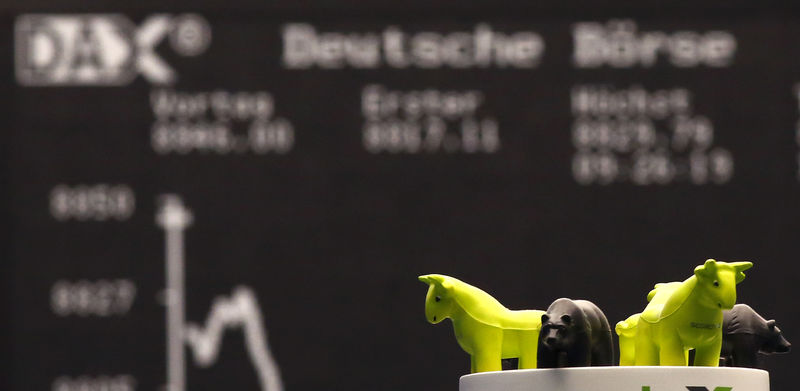By Peter Nurse
Investing.com - European stock markets are seen opening mixed on Thursday, as investors pause for breath after a three-day rally while the earnings season continues.
At 2:05 AM ET (0705 GMT), the DAX futures contract in Germany traded 0.4% lower, CAC 40 futures in France dropped 0.2%, while the FTSE 100 futures contract in the U.K. rose 0.2% and Italy’s FTSE MIB futures climbed 0.1%.
Expectations of additional U.S. stimulus have boosted global stock markets of late, particularly after the Democrats in Congress pushed ahead with a maneuver to ensure President Joe Biden's $1.9 trillion Covid relief package gets through largely undiluted, even without Republican support.
The retail trading frenzy of the last few days appears to be fading, with the prices of social media favored stocks like GameStop (NYSE:GME) subsiding after online brokers, especially Robinhood, curbed trading.
In Europe, the Italian market could lead the way again after former European Central Bank President Mario Draghi accepted a request from Italy’s head of state to try to form a government of national unity that will combat the pandemic and a deep recession.
Turning to corporate news, Deutsche Bank (DE:DBKGn) recorded its first annual profit in 2020 since 2014 on the back of strong gains at its investment banking division.
Nokia (NYSE:NOK) reported better-than-expected fourth-quarter revenue following a strategy revamp from new CEO Pekka Lundmark, while Shell 's(NYSE:RDSb) fourth-quarter profit dropped 87% from a year earlier, dragged down by continued weak energy consumption. Consumer giant Unilever (NYSE:UL) meanwhile reported a solid 3.5% rise in underlying sales growth in the three months through December.
On the economic data front, retail sales for the euro zone are expected to show a rebound in December after November’s sharp drop.
However, the focus will be on the Bank of England's latest policy-setting meeting. The central bank is expected to keep rates and its pace of bond purchases on hold, and may move further away from the idea of negative rates as the U.K. benefits of a rapid vaccination campaign.
Oil prices pushed higher Thursday, boosted by the commitment of a group of top producers to continue to curb output as well as U.S. crude stockpiles falling to the smallest level in more than 10 months.
The Organization of the Petroleum Exporting Countries and allies, a grouping known as OPEC+, extended its current oil output policy at a meeting on Wednesday, a move designed to balance a market having to cope with a hefty cut to demand as the pandemic weighs on global mobility.
U.S. crude stocks fell by 994,000 barrels last week to their lowest levels since March, according to the Energy Information Administration. The EIA also forecast that American oil production wouldn’t surpass 2019 levels until 2023.
U.S. crude futures traded 0.8% higher at $56.13 a barrel, after reaching their highest settlement level in a year on Wednesday. The international benchmark Brent contract rose 0.3% to $58.86, having earlier climbed to its highest in nearly a year.
Elsewhere, gold futures rose 0.6% to $1,824.30/oz, while EUR/USD traded 0.1% lower at 1.2052.
